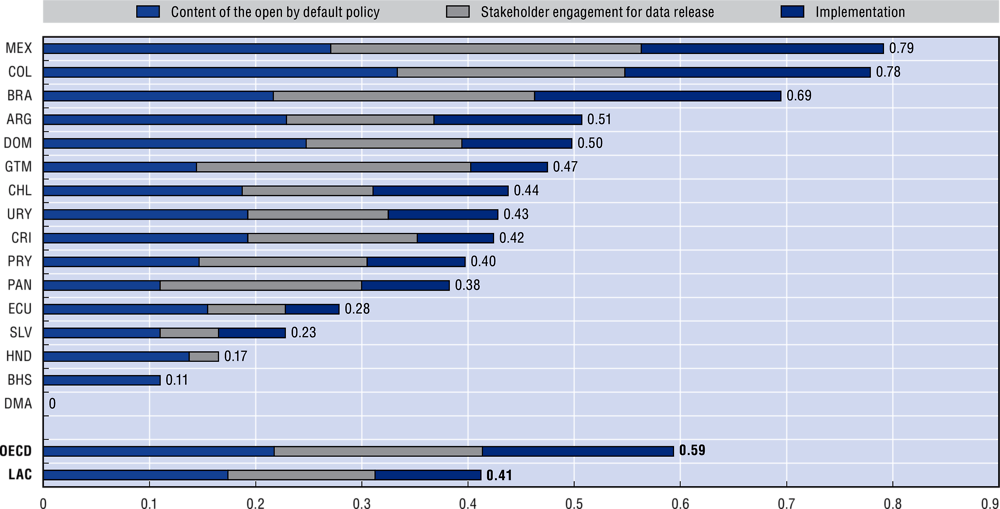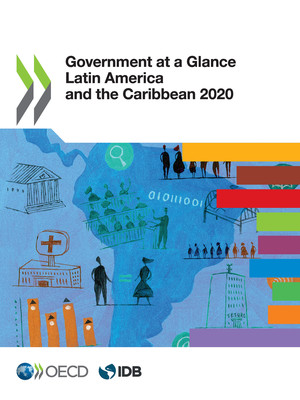copy the linklink copied!8.2. Data availability: Policy frameworks, stakeholder engagement and data release
When government data are available, they increase interaction between governments and citizens and enable co-creation opportunities with other stakeholders such as academics, civil society organisations and government institutions. Strong policy frameworks are key to ensure data availability and the integration on the delivery models of the public, private and social sectors.
Principle 1 of the International Open Data Charter is open by default: government data should be public unless their release comes into conflict with other principles. Three quarters of LAC countries assessed in the OURdata Index have a list of legitimate reasons that restrict publicly releasing government data by default. For example, in Chile, data should not be released if their disclosure affects the rights of individuals (e.g. their privacy) or their publicity poses a threat to national security or public interest, among others. Also, most countries have formal requirements to ensure that information published owing to transparency/anticorruption laws is released as open data.
Principle 2 (timely and comprehensive) refers to the involvement of citizens in the development of open data plans. The most common forms of consultations in LAC countries are physical public meetings (56%) and formal consultations (50%); virtual public meetings are less popular (25% of countries). Regarding stakeholders, 31% of LAC countries have consulted civil society organisations five times or more since 2017 (compared to 34% of OECD countries), the same proportion as civil servants. By comparison, 53% of OECD countries consulted civil servants 5 or more times. Academia, citizens, journalists and private sector organisations have been consulted five times or more since 2017 by 19% of LAC countries each. Around a third of OECD countries consulted the private sector five times or more.
To implement the commitments subscribed under these two principles, data must be released in formats that users can easily analyse. The vast majority of LAC countries (81%) release their data in tabular format, while half also publish maps.
Pillar 1 of the OURdata Index (Data availability) measures countries’ performance on the abovementioned policy issues. LAC countries score on average 0.41 in this pillar, compared to 0.59 for OECD countries. Mexico (0.79), Colombia (0.78), Brazil (0.69) and Argentina (0.51) have the highest scores in the region, as a result of their progressive open data agendas.
On average, LAC countries perform better in content of the open by default policy (0.17) than in stakeholder engagement (0.14) and implementation (0.10), a similar trend to the OECD. This is also the case for some countries, for instance Colombia obtained the maximum score in content of the open by default policy (0.33), and scored 0.21 in stakeholder engagement. The Bahamas scored 0.11 on content, which shows some efforts to set up an open by default policy, although they have not yet been implemented (it scored 0.00 in the other two sub-indicators). This evidence points to the need for investing further resources on user engagement from earlier stages of the policy process. For instance, to identify data demand which can lead to greater re-use in latter stages.
Some countries (Brazil and Mexico) had a higher score on stakeholder engagement. Guatemala had one of the highest scores in such sub-indicator, which is around double its score on content and more than three times that of implementation (0.07).
Pillar 1 on data availability measures the extent to which governments have adopted and implemented formal requirements to promote open government data at the central/federal level. This pillar covers policy elements relevant to principles 1 “Open by default” and 2 “Timely and comprehensive” of the International Open Data Charter. It consists of three sub-pillars: content of the open by default policy; stakeholder engagement for data release; and implementation. The three sub-pillars have an equal weight and each ranges from 0 to 0.33. Hence, the indicator ranges from 0 (minimum) to 1 (maximum). When aggregating to the final OURData Index, the data availability score is transformed to the range from 0 to 0.33 and with this, it is assigned an equal weight as the other two dimensions. The composite OURdata Index is based on the OECD analytical methodology described by Lafortune and Ubaldi (2018), which also maps the principles of the International Open Data Charter.
For more information on how data were collected, see previous section (Open Government Data).
For more information on the methodology and underlying data, see Annex D.
Further reading
Muente, A. and F. Serale (2018), Los datos abiertos en América Latina y el Caribe, Inter-American Development Bank, Washington, DC,https://doi.org/10.18235/0001202
OECD (2018), Open Government Data Report: Enhancing Policy Maturity for Sustainable Impact, OECD Digital Government Studies, OECD Publishing, Paris, https://doi.org/10.1787/9789264305847-en.
Figure notes
Data for Argentina, Chile, Colombia and Mexico were collected through the 2018 OECD Open Government Data Survey. Honduras established a central OGD portal in mid-2019, after the survey was conducted. In Brazil, since July 2019, the office of the comptroller general is responsible for OGD policies, and therefore, there have been some changes in implementation.
8.5 (Frequency of stakeholder consultation since 2017, 2019) is available online in Annex F.



